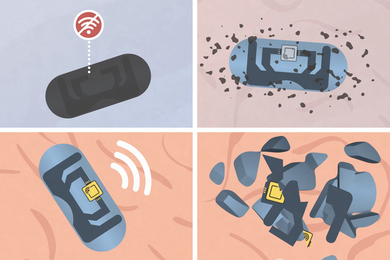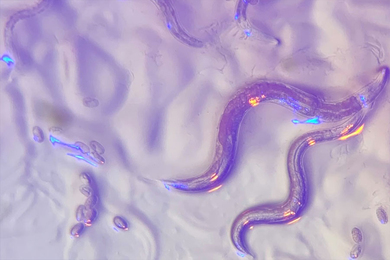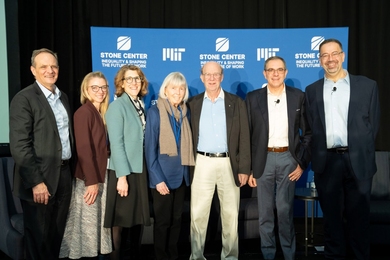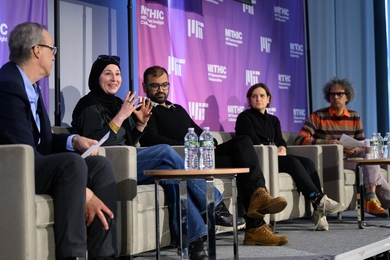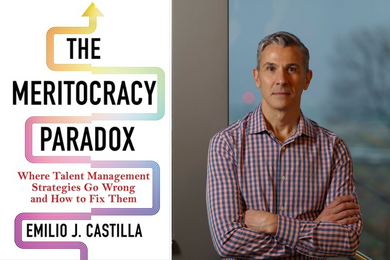Chassitty Saldana, who turns 13 this July, isn’t quite old enough to go to college. But when the time comes, her dorm will no doubt feel like home. That’s because Chassitty essentially grew up on the MIT campus. Her mother, Noramay Cadena ’03 — who will receive her SM and MBA at Commencement today — raised her as a single mom while studying mechanical engineering as an undergraduate.
Chassitty was just a toddler when her mother, who had recently graduated from San Fernando High School in California, moved the two of them across the country to enroll at MIT. “Many young moms usually drop out of school, and it’s really cool how my mom kept going,” she says. “There’s a picture of her doing homework and I was sleeping on her lap. She took care of me all by herself while we were at the dorms, and she was still working, and she graduated.”
This month, Cadena graduates again from MIT, this time with two master’s degrees. She earned an MBA and a master’s in engineering systems through Sloan’s two-year Leaders for Global Operations (LGO) program, which combines engineering, product development and management.
The program focuses in part on factory operations, a subject in which Cadena has first-hand experience. When she was not much older than her daughter is now, she spent a “miserable” summer stapling bungee cords alongside her mother in the Los Angeles factory where her parents worked for years.
“She would sit next to me and she’d say, ‘Faster! I don’t see your hands moving’ and ‘Too much talking, not enough moving,’” Cadena recalls. “It was her way of showing me what my life would be like if I didn’t go to college.”
That experience helped fuel Cadena’s academic ambitions. In high school, she excelled at math and science, and a friend who went to MIT urged her to apply. Even after Cadena became pregnant at 16, some of her teachers and counselors kept encouraging her. When MIT accepted her, she decided to take the leap, becoming the first in her family to go to college.
“At first I thought, ‘This is crazy — I can’t leave California, I can’t raise my daughter away from home,’” Cadena says. “But MIT made the decision very easy in not balking at the fact that I had a child.” (Chassitty’s father, Ernesto Saldana, initially objected, but a custody battle was settled out of court, granting Saldana scheduled visits and leaving Cadena free to take her daughter to Massachusetts.)
As a new college student and a new mother, Cadena lived in campus family housing. She found supportive classmates willing to accommodate her schedule, meeting at her dorm to work on assignments. And she made every effort to give her daughter a “normal” childhood. After class, Cadena would go home and spend several hours “just hanging out” with Chassitty before the two of them went to bed. Then she would wake up around midnight to study for several hours, go back to bed, and get up with Chassitty in the morning. “As far as she was concerned,” she says, “I went to bed with her and woke up with her every day.”
Striving for normalcy certainly took its toll on Cadena. She remembers preparing the classic college meal — Cup Noodles — while studying for finals during her junior year: “I was holding the cup over the sink, and boiling water was spilling around my hand,” she says. “I was so tired I didn’t feel it, and didn’t react until I saw my skin peeling back.”
No matter how much stress she was under, Cadena always made a point of appearing like every other student. “I never wanted to be the person that always had an excuse and needed special accommodations,” she says. But she occasionally brought her daughter to class in a pinch. After an apple-picking excursion, she didn’t have time to drop Chassitty off with the babysitter. “I remember coming to Thermodynamics with her and our bag of apples,” she says. “We kind of snuck into the classroom and sat in the back, and she sat there and scribbled.”
Another time, Cadena couldn’t find a babysitter and had to take Chassitty to the machine shop to work on a group project. The lab technician told her that a child in the shop posed a safety hazard and asked her to leave. “A lot of my friends who were there threatened to walk out,” she recalls. She and her daughter ultimately left class for the day.
The incident caught the attention of the mechanical engineering department head, who moved Chassitty to the top of the waitlist for an on-campus child-care program. That ultimately freed Cadena to do more. She became co-director of the student-run Teatro Latino, which features works by Latin American playwrights. And in 2001, President Charles M. Vest appointed her to the Council on Family and Work, where she helped draft a campus-wide survey on the quality of life at MIT. “I saw the Family Resource Center change and improve as a result of that, including more programs, more funding and a bigger network of information,” she says.
As an undergraduate, Cadena also worked in the Office of the Dean for Graduate Education, and, as a student recruiter for MIT’s SMART (Student Minority Admissions Recruiting Team) program, she returned to her alma mater to encourage Latino students to think about college. While they viewed engineering as daunting, her role as a young mother was what really got their attention.
“The reaction to engineering is that it’s something that’s hard and still feels unreachable to a lot of students,” she says. “What excites them most is to know I’m a single mom and that [success after high school] is possible.”
After Cadena earned her SB in mechanical engineering in 2003, mother and daughter moved back to California, where Cadena became a spacecraft-test director (and later a 787 Dreamliner supervisor) at Boeing. Six years into the job, she applied to MIT’s LGO program, with Boeing as her sponsor, to learn more about management. And in 2009, she and Chassitty headed back east — this time, both as students. After dinner, Chassitty would solve homework problems for her middle-school pre-algebra class while her mother read case studies in supply chain management.
Cadena also worked as a graduate assistant in MIT’s Latino Cultural Center and served on the Council on Race and Diversity. In November 2009 she was on a team of four LGO/Sloan students who placed first in the MBA Exclusive Case Competition in Washington, D.C. Charged with improving Amtrak’s operational efficiency, Cadena and her team proposed, among other things, empowering its unionized workforce by engaging them in improvement workshops. “She is a person of action and vision,” says Blanche E. Staton, senior associate dean for graduate education.
In 2010, as part of the LGO internship program, Cadena worked for six months at Amgen, developing a supply chain management program that helps the California-based biotech company collaborate with its suppliers. Her interest in factory operations has also taken her (and sometimes Chassitty) on LGO-sponsored trips to China, Japan, Brazil and Argentina to observe factory operations at companies such as GM, Volkswagen and Dell.
“Something that’s cool to see is a new focus on people on the shop floor — making workstations ergonomic, making sure people are moved every few hours so they’re not doing the same repetitive tasks all day,” she says. “As someone who’s worked in a factory and has been close to factory operations through my parents, I’ve seen how hard and how physically straining shop-floor jobs can be.”
At press time, Cadena was talking to Boeing about several job opportunities, including working on commercial satellites in Southern California or wide-body commercial airplanes near Seattle, or helping ramp up a new Boeing 787 Dreamliner facility in South Carolina. She also plans to dabble in public K-12 education.
Meanwhile, Chassitty, who spent last summer at a gifted program at Stanford University, has plans of her own. “Part of me kind of wants to be a veterinarian, because I really like animals,” she says. “And my mom’s here at a great school, and I want to follow her path. I’ve seen what my mom can do, and I want to do it, too.”
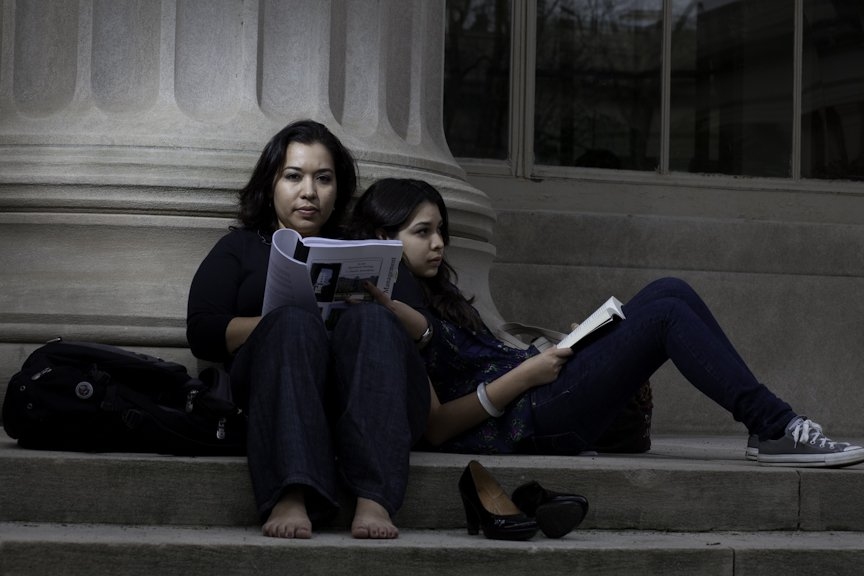
Press Mentions
NPR
In an interview with NPR, alumna Noramay Cadena and her daughter, Chassitty Saldana, discuss how Cadena completed her MIT degrees while raising Saldana. Cadena tells Saldana that graduating from MIT “gave me this huge sense of hope for what you would do."
WBUR
Alumna Noramay Cadena writes for WBUR about encouraging Latinas to pursue STEM careers, sharing how an MIT student inspired her. “Here was a successful person who looked like me, who sounded like me, and who truly understood my life experience, telling me I had what it took to go to MIT.”
